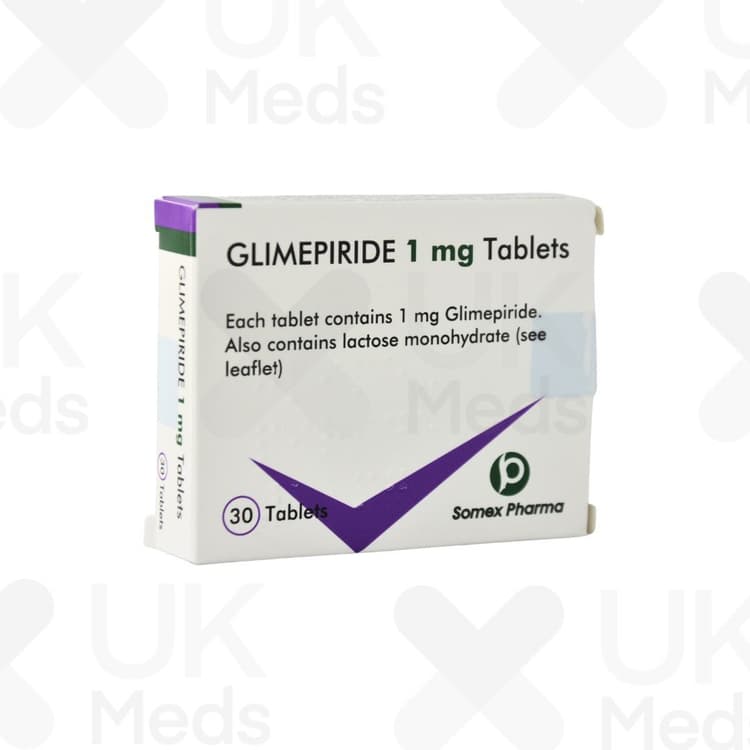Recharge your cells from within and enjoy 20% OFF NAD+ for a limited time only - shop now
- Home
- Chronic Conditions
- Diabetes Medication
- Glimepiride
Glimepiride

Images for illustrative purposes only
Start Your Expert Consultation
Glimepiride is an oral medication that belongs to the class of sulfonylurea drugs. It is primarily used to treat type 2 diabetes, a condition characterized by high blood sugar levels. Glimepiride contains the active ingredient glimepiride itself, which works by stimulating the release of insulin from the pancreas and increasing the sensitivity of cells to insulin.
- Increases insulin production
- Suitable for adults
- Treats type 2 diabetes.
More information
A Doctor's Overview
 | GP and surgeon, Dr Shane Charles (MBBS, MRCS, PgDip SEM) provides a simple explanation of the medication below: 'Glimepiride is a medication that is used in the management of persons with high blood sugar (Type 2 diabetes mellitus (T2DM)).'. If you think this is a treatment that can help you, start an online consultation now for a registered prescriber to review. If treatment is deemed suitable, they can prescribe it, and we can deliver it to you from the comfort of your own home with a range of convenient delivery and payment options for you to choose from. If you have any questions about a medication, you should always consult your doctor with any questions prior to starting treatment, to ensure that it is safe and suitable for you. |
Buy Glimepiride Online in the UK
Where can I buy Glimepiride online?
You can buy Glimepiride online from UK Meds. Before your order is approved, you will need to complete a quick online consultation with a registered independent prescriber. This ensures the medication is safe and suitable for you.
Glimepiride - Key Information
What Is Glimepiride?
Glimepiride is a medication used to treat type 2 diabetes. This condition occurs when the body does not produce enough insulin, causing high blood sugar levels.
How Does Glimepiride Work?
Glimepiride belongs to a group of medications called sulfonylureas. It helps lower blood sugar by stimulating the pancreas to produce more insulin, allowing the body to control blood sugar levels more effectively.
What do Glimepiride users have to say?
Glimepiride Reviews
Read first hand what other UK Meds customers think about Glimepiride and it's impact on patients lives on our customer reviews above. For further context there are also a large selection of Glimepiride reviews describing what people think about their experiences with the medication available at Drugs.com and Web MD.
It is important to note that people may have different experiences when they use Glimepiride. If someone states that their medication did not work as they had hoped, it does not mean that it will not work for you. If you believe that it is the right medication for you then the best thing to do is to consult your doctor or healthcare professional, and judge the medication based on your own experiences if they recommend it as a treatment. Before starting a medication you should always consult with your healthcare provider first to ensure that it is safe and suitable for your individual needs.
Patient Information Leaflet
For more information on the prescription medication patients should refer to the Glimepiride patient information leaflet.
Usage Advice
When Should You Take Glimepiride?
You should take Glimepiride exactly as instructed by your healthcare provider. Most people take it in the morning with breakfast, as it must be taken with food to work effectively and reduce the risk of low blood sugar.
Dosage
What Is the Recommended Dosage?
Always take Glimepiride exactly as prescribed by your doctor. The usual starting dose is 1mg once a day, but your doctor may adjust this depending on your needs. The maximum daily dose is 6mg. Never change your dose without speaking to your healthcare provider.
Side Effects & Precautions
Who Can Take Glimepiride?
Glimepiride is suitable for adults over 18 with type 2 diabetes. It helps manage blood sugar levels when diet and exercise alone are not enough.
Who Should Avoid Glimepiride?
Glimepiride is not suitable for:
- Children under 18 years old
- People with type 1 diabetes
- Those with severe kidney or liver disease
- People with G6PD deficiency (a rare blood condition)
- Those about to undergo surgery
Can You Take Glimepiride When Pregnant or Breastfeeding?
- Pregnancy: Glimepiride is not recommended due to limited safety data. Your doctor may prescribe an alternative medication.
- Breastfeeding: It is not advised as it could lower your baby's blood sugar. Speak to your doctor for safer options.
Does Glimepiride Interact with Other Medications?
Yes, Glimepiride can interact with other medicines. Tell your doctor if you take:
- Steroids (e.g. prednisolone)
- Heart, blood pressure, or cholesterol medications
- Antibiotics or antifungal treatments
- Rifampicin (used for tuberculosis)
- Other diabetes medications
Possible Side Effects of Glimepiride
Most people tolerate Glimepiride well, but some may experience:
- Low blood sugar (hypoglycaemia) – signs include dizziness, sweating, or shakiness
- Allergic reactions – such as rashes or swelling
A pharmacist's overview of the side effects of this medication and how to manage them:
 | Senior Specialist Pharmacist, Dania Al-Zarrad, provides a simple explanation of the common side effects of the medication and how you can manage them: Can cause hypoglycaemia and nausea, with severe hypoglycaemia as a serious risk; educate patients and adjust dose in older adults. Regular hepatic and haematological monitoring but limited evidence of clinical value. The risk of hypoglycaemia associated with sulfonylureas should be discussed with the patient, especially when concomitant glucose-lowering drugs are prescribed. Drivers need to be particularly careful to avoid hypoglycaemia and should be warned of the problems. |
Important Warnings
Always read the patient information leaflet before starting Glimepiride. If you have any concerns, speak to your doctor or pharmacist.
Learn more with UK Meds support resources for Glimepiride:
- Do I Have Diabetes? Quiz - Take this quiz to help identify if you might have diabetes and should get tested.
- What’s the Difference Between Type 1 and Type 2 Diabetes? - Learn the key differences between Type 1 and Type 2 diabetes and how they affect your body.
- Guide to Prediabetes: Causes, Symptoms, and Treatments - Understand prediabetes, its causes, symptoms, and how to prevent it from progressing to Type 2 diabetes.
- What Are the Different Types of Diabetes Medication? - Explore the different medications used to manage diabetes and how they help control blood sugar.
- Type 2 Diabetes Treatment and Testing Guide - Learn how Type 2 diabetes is treated and the tests used to monitor your blood sugar levels.
- New Year’s Resolution: Managing Your Diabetes - Learn how setting goals in the new year can help you better manage your diabetes.
- Healthier You: NHS Diabetes Prevention Programme - Discover how the NHS Diabetes Prevention Programme helps you reduce the risk of developing Type 2 diabetes.
Here to help you
Our Customer Service is available Monday to Friday 9am - 5pm. If you need urgent assistance, do not use this service. Call 111, or in an emergency call 999. Visit our help section


